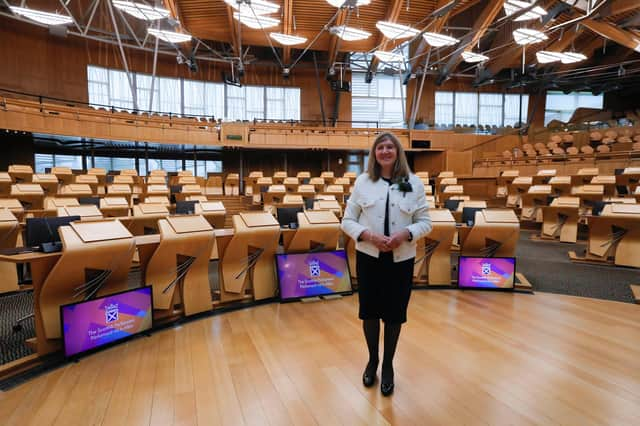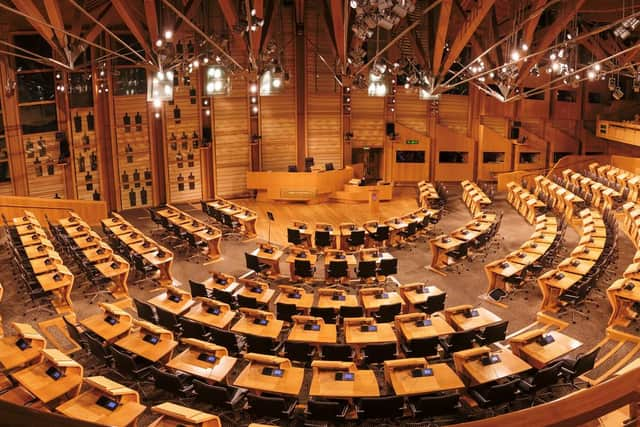Scottish Parliament's new Presiding Officer Alison Johnstone needs to lead reform to help MSPs hold the government to account – Murdo Fraser MSP


Given the party balance in the new Chamber, and the SNP’s reluctance to give up an MSP which would take them below 64 votes, this was a harder task than might be imagined.
In the end, there was just one candidate who came forward, Alison Johnstone of the Greens, who will be a fair and capable holder of this important position.
Advertisement
Hide AdAdvertisement
Hide AdThe Presiding Officer of Parliament is not just there to chair meetings. This is also a leadership role, both in terms of representation of the Parliament externally, but also in terms of ensuring that the institution functions as it should, maximising the opportunities for MSPs from all parties to hold the government to account.
Previous Presiding Officers have spearheaded important reforms. The most recent SNP holder of the position, Tricia Marwick, rearranged the parliamentary timetable so that plenary sessions were held on three days in each week as opposed to simply two, to provide greater opportunity for ministers to be questioned by MSPs.
The immediate past Presiding Officer, Labour’s Ken Mackintosh, had to deal with the consequences of the Covid pandemic, and introduce hybrid sitting and voting for those members not physically able to be present in the Chamber.
Alison Johnstone as the new Presiding Officer will have a number of key decisions to take at an early stage. Whilst in the short-term Covid restrictions will mean that hybrid working will have to remain, there is a choice to be made about such arrangements in the longer term.


There is, in my view, still an argument for some form of hybrid proceedings post-Covid. For those representing constituencies geographically distant from Edinburgh, or those with particular family or caring commitments, hybrid working has made it much easier for them to be able to contribute meaningfully to parliamentary business.
I was interested to see that on Monday the John Smith Centre published the results of a survey they had conducted which showed that more than 60 per cent of the public agreed that remote working would help increase the accessibility of Parliament for women and carers. This is undoubtedly correct.
That said, I think all MSPs would recognise that nothing beats a debate where all members are physically present in the Chamber. Too many debates feature a succession of pre-written speeches, simply read out by MSPs, and bearing very little relation to the contributions which have gone before.
This issue is exacerbated when contributions are made remotely, with no ability for those engaging in such a manner to intervene on others, or be intervened on. So whilst hybrid working has its place in the future, it is important that we find a balance, so it is done for good reasons, rather than becoming the norm for all.
Advertisement
Hide AdAdvertisement
Hide AdHolyrood has already lost too many talented female MSPs, from different parties, because of the tension between parliamentary business and family commitments.
The tendency in the last session to change the parliamentary timetable at short notice, and in particular to extend sittings into the evening, wreaked havoc for those with childcare responsibilities.
When a child has to be collected from nursery or after school activities at a particular time, it is infuriating to find out that on the whim of the Scottish government, parliamentary business has been extended by an hour with just 24 hours’ notice.
There is an important role here for the new Presiding Officer to ensure that a regular pattern of sitting hours is agreed and then adhered to, and that Parliament reasserts itself over the Executive in terms of its business programme.
These are the immediate challenges facing Alison Johnstone in her new role. In the longer term, there are other reforms that are required, not least those which were identified as part of the inquiry into the Scottish government’s handling of harassment complaints against the former First Minister, Alex Salmond. That episode highlighted the relative weakness of Holyrood compared to the House of Commons.
We saw the Scottish Parliament agreeing to publish written evidence from Alex Salmond, and then withdrawing it and republishing it in amended form, following a threat of prosecution from the Crown Office. It is inconceivable that the House of Commons would have behaved in such a craven fashion, and it points to the need to strengthen the powers of Holyrood.
At the very least, we need to see the same protections of parliamentary privilege that apply at Westminster also being granted to MSPs. I would hope that this is a cause that the new Presiding Officer will champion, and be prepared to take forward on a cross-party basis.
We also need to consider how the committees at Holyrood might be strengthened. The seasoned political observer Professor James Mitchell has written that “Scottish parliamentary committees have been poor in comparison with those in the Commons”.
Advertisement
Hide AdAdvertisement
Hide AdThis is a particularly significant issue given the absence of a second chamber at Holyrood, and the expectation that committees would fulfil that role when it comes to revising legislation (an expectation which, sadly, appears not to have been fulfilled).
There have been ongoing discussions for some time around the question of whether committee conveners should be elected by MSPs, rather than simply being appointed by party whips. That is the sort of reform that now needs to be progressed, to strengthen Parliament in relation to its scrutiny role of the Executive.
With two able Deputies elected by Parliament last week to assist her, Alison Johnstone is in a strong position to take forward the reforms that Parliament now needs to strengthen it as an institution. I am sure that if she has an ambition to be reforming Presiding Officer, she will have widespread support from across the Chamber.
Murdo Fraser is a Scottish Conservative MSP for Mid Scotland and Fife
A message from the Editor:
Thank you for reading this article. We're more reliant on your support than ever as the shift in consumer habits brought about by coronavirus impacts our advertisers.
If you haven't already, please consider supporting our trusted, fact-checked journalism by taking out a digital subscription.
Comments
Want to join the conversation? Please or to comment on this article.
